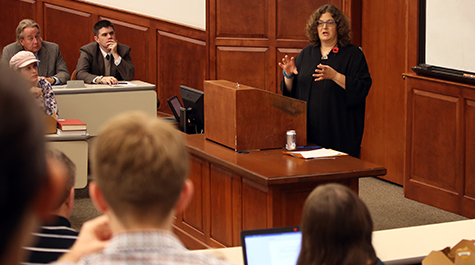William & Mary Law hosts Marshall-Wythe Lecture in Legal History
William & Mary Law School hosted its second Marshall-Wythe Lecture in Legal History on Nov. 6.
Professor Catharine MacMillan, who holds the Chair in Private Law at the Dickson Poon School of Law at King’s College London, delivered a lecture titled “Personal Networks and the Transference of Legal Ideas: the Trans-Atlantic Career of Judah P. Benjamin.” The hour-long presentation followed her workshop a day earlier on “A Political Exile's Odyssey: The Strange Life of Judah P. Benjamin.”
Professor Thomas J. McSweeney introduced the event, which was co-hosted by the Jewish Law Students Association, the Legal History Society, and the Selden Society and was attended by students, professors and local history enthusiasts.
MacMillan, a noted legal historian, discussed the life of 19th-century lawyer Judah P. Benjamin. Her vast research centers on how Benjamin’s career was powered by his ability to work through different networks composed of plantation owners, lawyers, politicians, family, and clients. She illustrated how Benjamin, who dropped out of Yale and began a legal practice in New Orleans, tapped into his diverse networks to obtain several high-ranking positions, from U.S. Senator to Confederate Attorney General, Secretary of War, and Secretary of State. He was the first Jewish person to serve on an executive cabinet in the U.S.
Even after moving to England near the end of the Civil War, MacMillan explained, Benjamin was able to work his charm and networking skills to end his career as a prominent barrister. “We think of law as something that moves across the Atlantic to the New World but interestingly with Benjamin, we see the reverse. When we look at the English common law, we see elements of French law which are actually elements of Louisiana law,” said MacMillan. “As a barrister, he takes the law and sends it in a different directional course than it otherwise would have.”
Benjamin also became an author and wrote a leading treatise on the sale of personal property, influencing later English treatises and the development of sale itself.
Benjamin destroyed most his records later in life so biographers have struggled to paint a picture of his varied career. MacMillan, however, is able to shed new light by focusing on his legal career, his powerful networks and his ability to influence the law.
Earlier in the year, the Law School hosted its inaugural Marshall-Wythe Lecture in Legal History. Professor William E. Nelson delivered a lecture titled “The Red and the Blue: Diverging Attitudes toward Racial Discrimination in Twentieth-Century Texas and New York.”
About William & Mary Law School
Thomas Jefferson founded William & Mary Law School in 1779 to train leaders for the new nation. Now in its third century, America's oldest law school continues its historic mission of educating citizen lawyers who are prepared both to lead and to serve.
